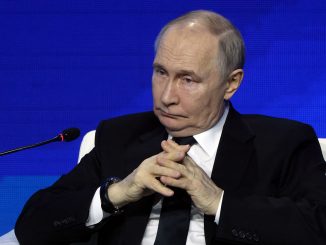
A boy looks at an exhibition displaying destroyed Russian military vehicles in Kyiv, April 15, 2025 [Marko Djurica/Reuters]
| Published April 18, 2025
Europe has the industrial and financial might to help Ukraine without the US, says distinguished historian, Phillips O’Brien.
In a recent interview with Al Jazeera, Phillips O’Brien, a distinguished historian and head of the School of International Relations at St Andrews University, challenges the prevailing narrative of the Russian military as an unstoppable force. He argues that this perception is a myth, and that Europe possesses the industrial and financial capacity to support Ukraine independently, even in the absence of U.S. involvement.
The Myth of Russian Military Supremacy
O’Brien contends that the Russian military’s reputation for invincibility is overstated. He points to the resilience of Ukrainian forces, who have managed to withstand and repel Russian advances despite facing a larger and better-equipped adversary. This resilience, he suggests, undermines the notion of Russian military superiority and highlights the effectiveness of Ukraine’s defense strategies.
Europe’s Role in Supporting Ukraine
The historian emphasizes that Europe, along with allies like Japan and Australia, has the means to sustain Ukraine’s defense efforts. He notes that Europe’s combined industrial output and financial resources are sufficient to provide the necessary support for Ukraine to continue resisting Russian aggression. This perspective challenges the idea that Ukraine is wholly dependent on U.S. assistance and underscores the potential for a more autonomous European response.
Here’s a pros and cons analysis of the Al Jazeera feature article titled “The Russian military is not this unstoppable machine”, based on historian Phillips O’Brien’s insights:
SOURCES: AL JAZEERA – ‘The Russian military is not this unstoppable machine’: Historian





Be the first to comment